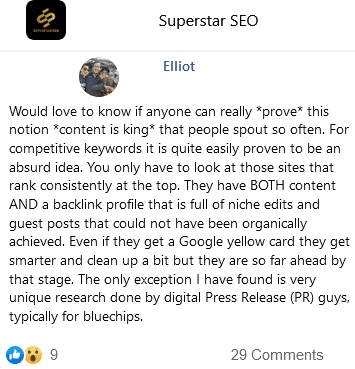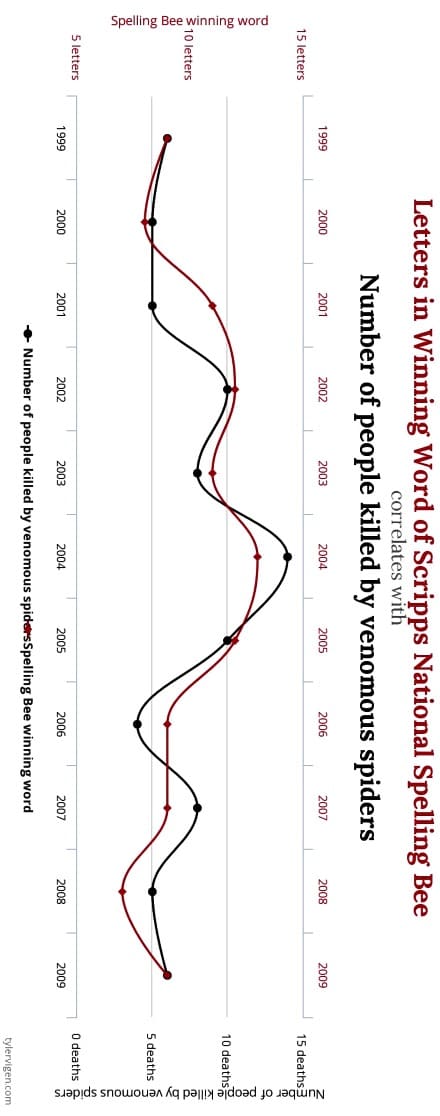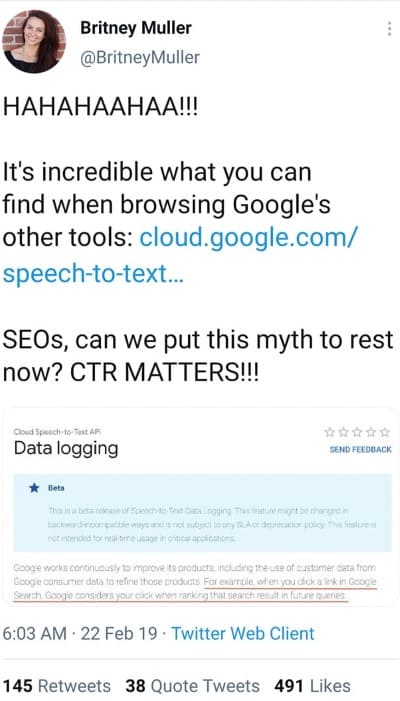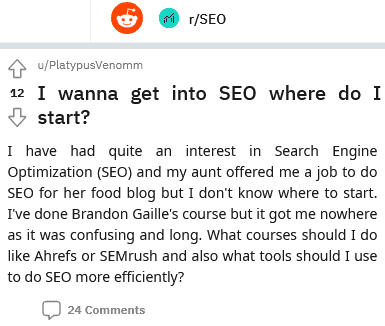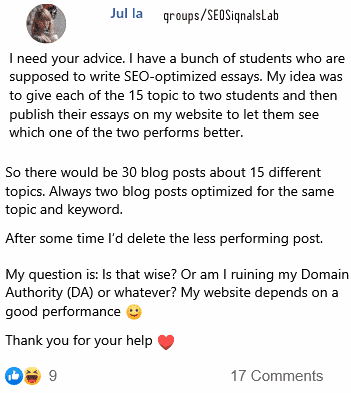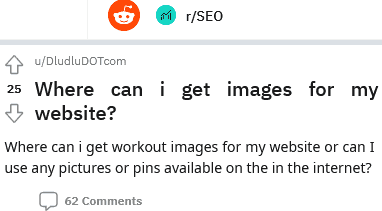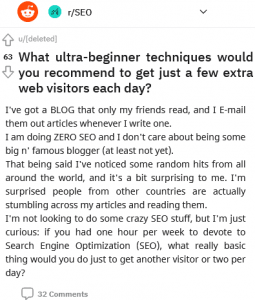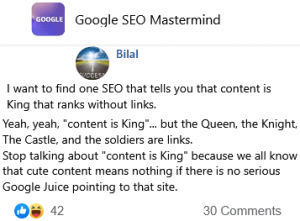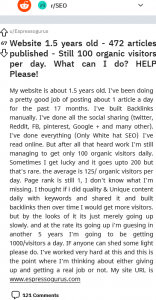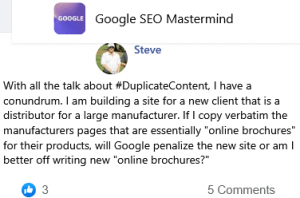Would love to know if anyone can really *prove* this notion *content is king* that people spout so often. For competitive keywords it is quite easily proven to be an absurd idea. You only have to look at those sites that rank consistently at the top. They have BOTH content AND a backlink profile that is full of niche edits and guest posts that could not have been organically achieved. Even if they get a Google yellow card they get smarter and clean up a bit but they are so far ahead by that stage. The only exception I have found is very unique research done by digital Press Release (PR) guys, typically for bluechips.
8 👍🏽1 🤯929 💬🗨
📰👈
Depends what level you're operating at. Search Engine Optimization (SEO) can be very different for enterprise or larger companies. I do work the for the largest electrical retailer in the UK and we don't actively seek out guest posts and other manual backlinking stuff as we don't need too. As you mention we do go down the digital PR route much more actively.
Elliot ✍️
Two things that seem to more or less prove backlinks are the meat and potatoes of SEO: 1. Google issues a penalty (or people believe that this is a real threat if you overplay your hand on backlinks 2. The smaller operators at the top of the rankings have hugely exploited their backlink options.
Yeah but who eats just meat and potatoes? Theres a whole pyramid and content is a massive part of a well-rounded SEO diet.
Agui
We have a blog post which has much less backlinks than the one that used to dominate the keyword. Now, we're #1 and I believe it has much to do with content quality plus Click Through Rate (CTR) plus avg time on page. Also, we have a few pages that are #1 that have very little backlinks too. It's like they got to #1 after a month of publishing them with zero link building involved. Saying that, we have other posts that are really high quality but can't get to Page 1 due to the backlink power of competitors. So it's fair to say you need to start by having the "best quality" content then get some links. You get better chances that way. One-two combo.
Finally a good answer to this question!
Tye
Click Through Rate (CTR) manipulation is king
CTR manipulation is great to pad your reports to a client, but I'm not sure how it helps SEO in any way.
Agui » Truslow
It does help especially if you're in the lower half of Page 1. If people click on your page instead of the ones above you, that's definitely a positive signal. I've tested this and I can confirm it. SEO users should therefore think like a PPC manager when doing the title tag and meta description.
Tye » Agui
One thing I've found through my years is no client actually cares as much about SEO as you do. All they care about is getting a return on their investment and how you do that is ultimately up to you. I'm not condoning any particular method, I'm more so making a joke – but it's still a viable option
Truslow 🎩 » Agui
Right… I still would argue that it doesn't help ranking – and we've talked about that many times in here. But I agree 100% that if you have a good CTR and you can get the clicks by having people skip down past previous ones and click yours – that's a worthy goal and objective.
But that's not "Manipulation" – that's good strategy and something worth monitoring. They are two different things.
Agui » Truslow
I totally understand what you mean. Organic CTR being a ranking factor has indeed been a hotly-debated topic and I have no intentions of starting a new one. Haha. I can't prove causation but I've seen correlation so there's no harm in doing it. It's just me trusting my data rather than believing everything Google says. I may be wrong. As for CTR manipulation, I don't know. Maybe this is similar to organic backlinks vs bought links. Open for more insights.
Truslow 🎩
There are few things more dangerous in Search Engine Optimization (SEO) than mistaking correlation with causation. Just because data correlates, it doesn't necessarily mean that the two things are related in any way.
📰👈
Agui » Truslow
But then again, much of what we do in SEO is simply based on correlation. We're not Google engineers and we don't exactly know the original recipe so we play around with different herbs and spices (way more than 11!) by testing and looking at the data. Appreciate the insights though. 👍
Truslow 🎩
If the correlation can be proven to be unrelated with basic logic and simple math – then keeping that ingredient in your soup isn't going to do you any good. CTR as a ranking signal is easy to prove a useless metric for them to use. I don't have the energy to explain it again now… but… it's not a thing. Really.
Agui » Truslow
Let's agree to disagree. Appreciate your insights.
📰👈
Truslow 🎩
You'll also notice that they've completely removed that language from that page (because it's not fully explained). The actual language they tend to use now is something like "When you click a link in Google Search, Google considers your click when ranking that search result in future queries performed by you." <— The last three words changed.
That language has been removed from everywhere (that I know of) where it isn't explained completely. The one area where that is still used is when it comes to "Search Personalization" And… if we're talking about that then yes… Click Through Rate (CTR) does have an effect on ranking – but not in the way most of you folks think it does.
If I click a site often – and I'm logged in and Google knows who I am – then yes. In relevant searches, that site or page can move up and be featured more prominently. But that only happens for sites that I personally click on and in searches that I personally perform. Google even takes that a step further and sometimes realizes that I search for Pizza a lot more than Chinese food for takeout – so if I type in "Delivery" it's likely to show me more Pizza places than Chinese ones.
The idea that manipulating CTR actually has an effect on overall rankings is just plain wrong. If it's being done by some anonymizing system – it won't have an effect – there's no one to attribute it to. Pumping up CTR by manual means would only really affect the rankings for the person doing the pumping.
There is more to this though – and part of why the myth lives on so strongly. To explain that, though, I need to take a step back and explain the problem with CTR being used this way…
When I search for "How Year was Bob Dylan born?" Whether I see a featured snippet or not – the answer to that question is likely visible right there in the search results. I don't need to click and I've got my right answer. The only way I'd need to click on anything on the page is if none of them showed me the answer. There's no click to measure there. The expected and the best result here is one that results in exactly ZERO clicks.
For other types of searches where "comparing" is the intent – sometimes multiple clicks are the desired outcome. People may be looking to compare a couple of different products and see what's better – in terms of quality, price, and many other factors. If I ask "Coke or Pepsi?" for example, I'm likely to click on several opinions and articles about it because I'm not likely to be satisfied with just one opinion. (NOTE: This is one of several reasons that bounce rate, on its own, is a useless signal for ranking, too).
As such.. CTR can play a role, but only when combined with the action the user takes NEXT. Do they go back to the same set of results and click something else? Do they refine their search to try to get better results? Do they abandon the search altogether? Each of those things sends a signal about SERP satisfaction – and that's less about the value of any given page, but about how the search results look as a whole.
And even with all that – there's really only some value to any of that when compared across many many many interactions. If a set of results produces a site that is currently ranked 4th and a huge number of (unique, identifiable) people who click that result then never go back to the search, Google might assume they were satisfied. That's not REALLY CTR in play there, though. Not in any raw sense that one could easily manipulate. And really – that's the point.
Conor
As mentioned above backlinks are generally for starting out and getting into the market. I think once you build a large brand and you are active in your niche you won't have to chase links as everyone should be talking about you anyways. Then you can focus most of your effort on creating content people will talk about for free
Taylor
I think you could test this.
Create a page with only a single word on the page and throw a bunch of backlinks to it.
Then create a website around a key topic – doesn't even have to be great.
Then check back in a year or two and see what's happening.
My money is on the content page
Content is King, and Backlinks are Troop
In What Conditions do you Outsource Backlink Installation Besides of By Yourself?
EAT, UX, Backlinks, Niche are Stronger than Other SEO Ranking Factors
Does Free Backlinks from Directory Submission Websites Give SEO Benefits, Especially Traffic?
